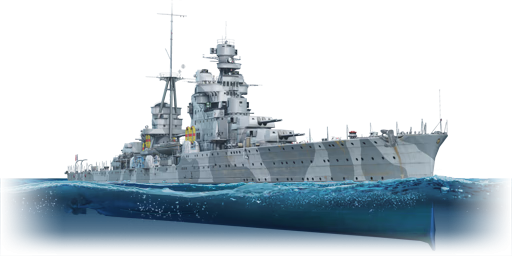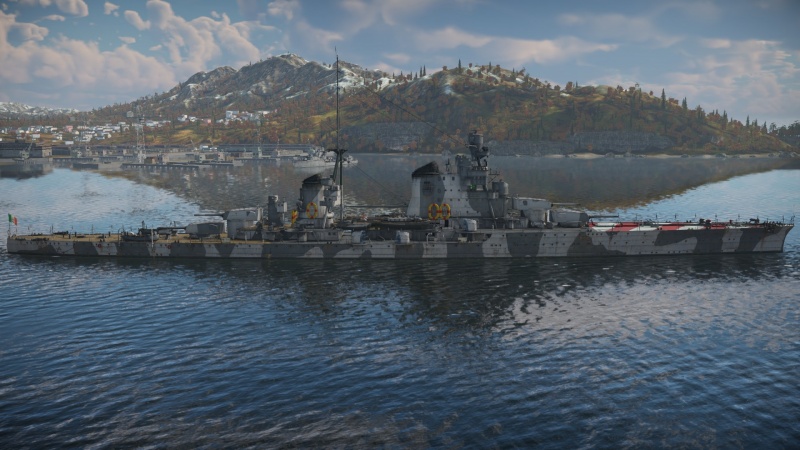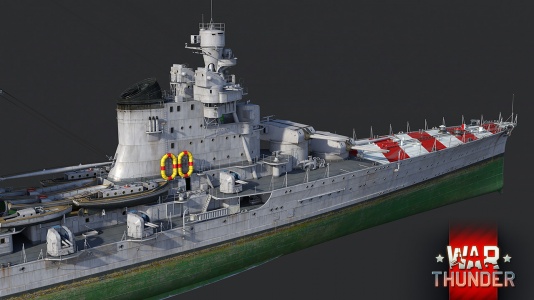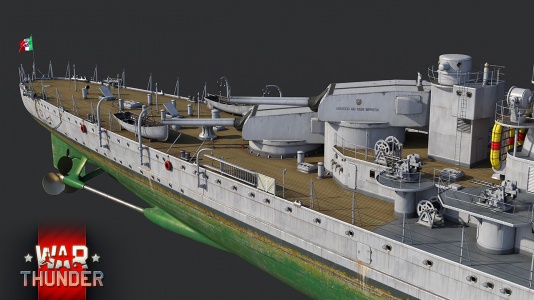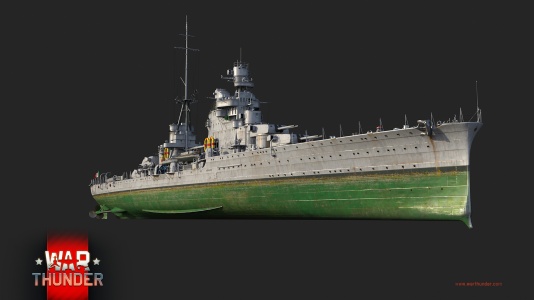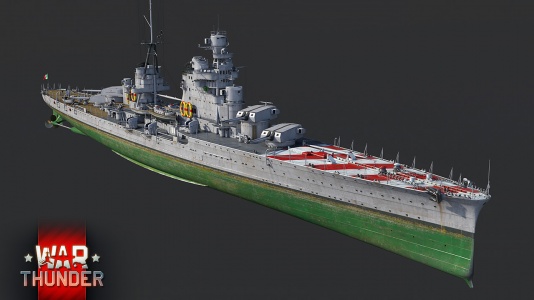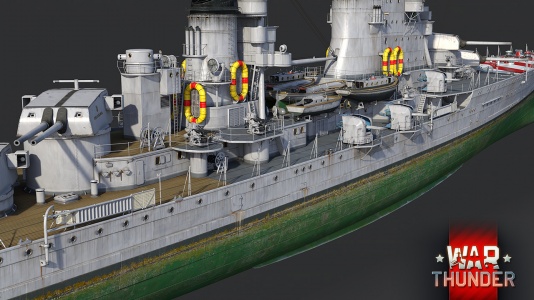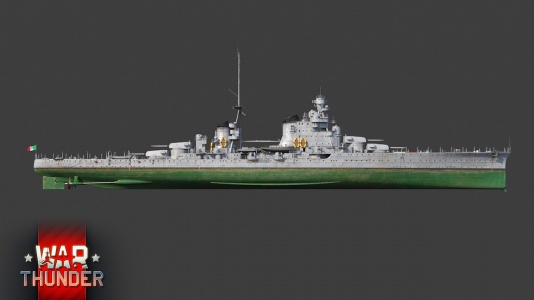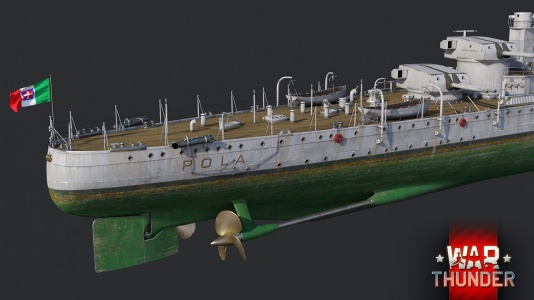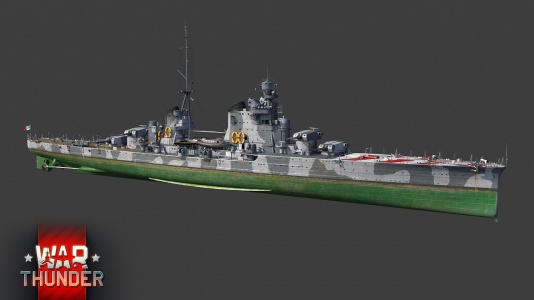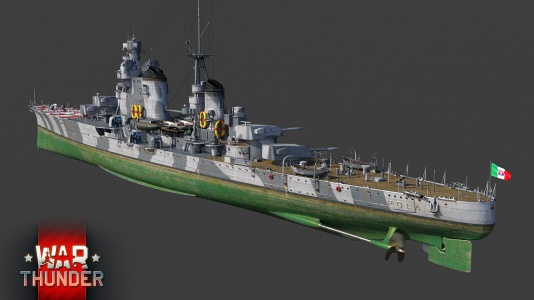Difference between revisions of "RN Pola"
SuperComrade (talk | contribs) (→Pros and cons) (Tag: Visual edit) |
SuperComrade (talk | contribs) (→Primary armament) (Tag: Visual edit) |
||
| Line 38: | Line 38: | ||
{{main|203 mm/53 Ansaldo mod.1927 (203 mm)}} | {{main|203 mm/53 Ansaldo mod.1927 (203 mm)}} | ||
| − | The ''Pola'' is armed with eight 203-mm 53-calibre Mod. | + | The ''Pola'' is armed with eight 203-mm 53-calibre Mod. 1927 guns, distributed in four twin turrets, two in the bow and two in the stern. The guns have a relatively low rate-of-fire of only 3.8 rounds/minute, which is only slightly faster than the rate-of-fire of the American heavy cruisers. They can fire HE, AP, and HE-DF shells. These shells have a fairly high muzzle velocity (900 m/s) and good ballistics, resulting in relatively short shell travel times and fairly high penetration for the AP shell. Unfortunately, they also all have the lowest explosive fillers compared to those of other similar 203-mm guns, with only 7.5 kg of TNT for the HE/HE-DF shells, and 3.12 kg of TNT for the AP shells. |
| − | The main guns also have a fairly inconsistent dispersion, resulting in inconsistent salvos at long ranges. Sometimes they will produce a very tight spread, and at other times they will instead give a large spread, straddling a target but not actually hitting it. | + | The main guns also have a fairly inconsistent dispersion, resulting in inconsistent salvos at long ranges. Sometimes they will produce a very tight spread, and at other times they will instead give a very large spread, straddling a target but not actually hitting it. |
=== Secondary armament === | === Secondary armament === | ||
| Line 66: | Line 66: | ||
However, because of the relatively small shell explosive fillers, low rate-of-fire, and small number of main guns, her damage output is on the low side, thus it is important to be careful when fighting other cruisers. Many of them have more guns and/or a higher rate of fire, and in a straight up close-range fight, they can out-damage the ''Pola'' over time. The ''Pola'' also does not carry any torpedoes for such fights, thus it is better to maintain some distance. | However, because of the relatively small shell explosive fillers, low rate-of-fire, and small number of main guns, her damage output is on the low side, thus it is important to be careful when fighting other cruisers. Many of them have more guns and/or a higher rate of fire, and in a straight up close-range fight, they can out-damage the ''Pola'' over time. The ''Pola'' also does not carry any torpedoes for such fights, thus it is better to maintain some distance. | ||
| + | |||
| + | As a BR 5.7 ship, the ''Pola'' can also face battleships regularly. In such matches, as with all cruisers, it is better to avoid fighting the battleships unless absolutely unavoidable, or if they are otherwise occupied by other ships and can be engaged with little to no risk. | ||
=== Pros and cons === | === Pros and cons === | ||
Revision as of 08:23, 28 December 2021
Contents
Description
The Zara-class, RN Pola, 1941 is a premium rank IV Italian heavy cruiser with a battle rating of 5.7 (AB/RB/SB). It was introduced in Update "Hot Tracks".
General info
Survivability and armour
The Pola (along with her sister ship Zara) is one of the most heavily armoured cruisers in the game. When angled, her thick 150 mm main belt can shrug off anything short of battleship shells from medium to long range. Her engines and magazines are also protected by a 20 mm upper deck and 70 mm lower deck plate, the thickest of any cruiser in the game. The bow and stern ends of the citadel are protected by 120 mm plating, which is thicker than the belt armour on many other cruisers. The large bow also acts as spaced armour against torpedoes and during head-on engagements, thanks to the plane hangar and catapult.
The main gun turrets, sporting 203 mm faces and 150 mm elsewhere, are virtually immune to HE shells and quite resistant to cruiser SAP shells. The barbettes are also protected by 140-150 mm plates. The bridge is protected all-around by 150 mm thick armour and is a small target, making it very difficult to hit and disable. The steering gear is also protected by 20 mm plating.
Furthermore, the Pola also has a very large crew complement, especially compared to Allied and Japanese heavy cruisers, which further enhances her survivability.
It is important to note that the ship has only two propeller shafts (most other cruisers have four), so losing one shaft will dramatically cripple the ship's mobility.
Mobility
Write about the ship's mobility. Evaluate its power and manoeuvrability, rudder rerouting speed, stopping speed at full tilt, with its maximum forward and reverse speed.
| Mobility Characteristics | |||
|---|---|---|---|
| Game Mode | Upgrade Status | Maximum Speed (km/h) | |
| Forward | Reverse | ||
| AB | |||
| Upgraded | 69 | 34 | |
| RB/SB | |||
| Upgraded | 59 | 29 | |
Modifications and economy
Armament
Primary armament
The Pola is armed with eight 203-mm 53-calibre Mod. 1927 guns, distributed in four twin turrets, two in the bow and two in the stern. The guns have a relatively low rate-of-fire of only 3.8 rounds/minute, which is only slightly faster than the rate-of-fire of the American heavy cruisers. They can fire HE, AP, and HE-DF shells. These shells have a fairly high muzzle velocity (900 m/s) and good ballistics, resulting in relatively short shell travel times and fairly high penetration for the AP shell. Unfortunately, they also all have the lowest explosive fillers compared to those of other similar 203-mm guns, with only 7.5 kg of TNT for the HE/HE-DF shells, and 3.12 kg of TNT for the AP shells.
The main guns also have a fairly inconsistent dispersion, resulting in inconsistent salvos at long ranges. Sometimes they will produce a very tight spread, and at other times they will instead give a very large spread, straddling a target but not actually hitting it.
Secondary armament
Some ships are fitted with weapons of various calibres. Secondary armaments are defined as weapons chosen with the control Select secondary weapon. Evaluate the secondary armaments and give advice on how to use them. Describe the ammunition available for the secondary armament. Provide recommendations on how to use them and which ammunition to choose. Remember that any anti-air armament, even heavy calibre weapons, belong in the next section. If there is no secondary armament, remove this section.
Anti-aircraft armament
An important part of the ship's armament responsible for air defence. Anti-aircraft armament is defined by the weapon chosen with the control Select anti-aircraft weapons. Talk about the ship's anti-air cannons and machine guns, the number of guns and their positions, their effective range, and about their overall effectiveness – including against surface targets. If there are no anti-aircraft armaments, remove this section.
Scout plane
In the bow there is a catapult with one Ro.43 scout floatplane, a two-seater equipped with two fixed 7.7 mm machine guns and a single defensive 7.7 mm machine gun turret, but no bombs. It can land and capture points (but only while the aircraft is being controlled by the player) and can also lay down a smoke screen (up to 3 times).
Usage in battles
The Pola relies on using her heavy protection and good speed to close the distance with enemy ships and get into effective combat range. This is because of the temperamental salvo dispersion of her main guns, which makes her more inconsistent at long range shooting compared to other heavy cruisers. Her heavy turret, bridge, and belt armour make her a tough target for other cruisers (especially light cruisers) and destroyers to quickly disable or neutralise, especially at range.
However, because of the relatively small shell explosive fillers, low rate-of-fire, and small number of main guns, her damage output is on the low side, thus it is important to be careful when fighting other cruisers. Many of them have more guns and/or a higher rate of fire, and in a straight up close-range fight, they can out-damage the Pola over time. The Pola also does not carry any torpedoes for such fights, thus it is better to maintain some distance.
As a BR 5.7 ship, the Pola can also face battleships regularly. In such matches, as with all cruisers, it is better to avoid fighting the battleships unless absolutely unavoidable, or if they are otherwise occupied by other ships and can be engaged with little to no risk.
Pros and cons
Pros:
- Thickest belt armour of any cruiser.
- Main gun turrets and bridge are also very heavily armoured.
- Large crew complement further enhances survivability.
- Wide firing arcs on secondary armament.
- Access to a scout seaplane.
- Main armament has access to HE-DF shells for use against aircraft.
Cons:
- Lacklustre anti-aircraft armament (especially light anti-aircraft guns) that also has a deadzone across the bow.
- Inconsistent salvo dispersion.
- Smallest explosive filler for both HE and AP shells among 8-inch/20-cm guns.
- Has only two propeller shafts (i.e., losing one cuts half the power output).
- Low damage output over time due to long reload, small shell filler, and having only eight barrels.
- Can be matched against battleships.
History
Devblog
Pola was laid down at the OTO Shipyard in Livorno in March 1931 as the last of the four Zara-class heavy cruisers. Following the class' nomenclature, Pola was named after a former Austro-Hungarian coastal city (today Pula, Croatia) which was annexed by Italy following the end of WWI. Pola's design remained virtually identical to the other ships of the class. However, as Pola was intended to act as a flagship, it received a larger bridge superstructure in order to accommodate the additional staff. This, as well as the missing 'carved out' sections of the hull sides below her bridge, distinguish her from other ships of the class.
Pola was launched in December 1932, and after only a brief fitting out period, was officially commissioned into service with the Regia Marina in the same month. In the interwar service period, Pola took part in two fleet reviews and participated in Italian non-intervention patrols during the Spanish Civil War along with other members of her class. Prior to the outbreak of WWII, Pola supported Italian ground forces during the occupation of Albania in April 1939.
During 1940, Pola frequently operated with her sister ships in concert with other elements of the Italian navy and engaged in a number of clashes with the Royal Navy in the Mediterranean. Pola was docked at Taranto during the devastating British air raid in November 1940, but unlike many other Italian warships present there, survived the attack unscathed.
After engaging British forces in the Battle of Cape Spartivento in late November, Pola found itself once again under air attack while in port at Naples. This time however, the ship did suffer minor damage and had to be drydocked for repairs until February of the next year.
After leaving drydock, the first major operation in which Pola took part was the Battle of Cape Matapan in late March 1941. It would also become the last battle, not just for Pola, but also for two of her sisterships - Zara and Fiume. Originally, the operation saw the assembled Italian fleet under the command of Admiral Angelo Iachino intercept a British convoy south of Crete. Pola was successfully torpedoed by British aircraft launched from HMS Formidable, quickly losing all power.
With Pola dead in the water, the Italian admiral ordered Zara, Fiume and a handful of destroyers to assist Pola later that night, however, unknown to the rescue party assembled around Pola, the superior British fleet closed in on them under the cover of darkness and guidance of radar to within point blank range before opening fire. The resulting naval engagement saw the destruction of mostall Italian warships present with heavy losses of 2303 dead and 1411 captured. After the brief battle, Pola, still afloat, was boarded by British sailors who searched the ship for valuables, taking her remaining crew as prisoners. In the early morning hours of 29 March 1941, the stricken Pola was torpedoed by the destroyer HMS Nubian, ultimately sealing her fate.
Media
- Skins
- Images
- Pola Devblog Images
See also
Links to articles on the War Thunder Wiki that you think will be useful for the reader, for example:
- reference to the series of the ship;
- links to approximate analogues of other nations and research trees.
External links
| Odero-Terni-Orlando Company | |
|---|---|
| Destroyers | |
| Turbine-class | RN Turbine · RN Aquilone |
| Dardo-class | RN Dardo |
| Soldati-class | RN Corazziere · RN Aviere · RN Geniere |
| Comandanti Medaglie d'Oro-class | RN Comandante Margottini |
| Light Cruisers | |
| Condottieri-class | Kerch* · RN Duca degli Abruzzi |
| Capitani Romani-class | RN Attilio Regolo · Guichen** |
| Heavy Cruisers | |
| Trento-class | RN Trento |
| Zara-class | RN Zara · RN Pola |
| Battleships | |
| Conte di Cavour-class | RN Leonardo da Vinci*** |
| Export | Tashkent**** |
| See Also | OTO Melara |
| *RN Duca d'Aosta before war reparation to the USSR | |
| **RN Scipione Africano before war reparation to France | |
| ***Previously ‘’Cantieri navali Odero’’ in Genoa-Sestri Ponente | |
| ****Built for the USSR | |
| Italy heavy cruisers | |
|---|---|
| Trento-class | RN Trento · RN Bolzano |
| Zara-class | RN Zara · RN Pola |
| Italy premium ships | |
|---|---|
| Motor torpedo boats | Freccia P-493 · MAS 569 · MS 444 · MC 485 |
| Motor gun boats | Sparviero |
| Sub-chasers | Folaga |
| Destroyers | RN Aquilone · RN Aviere · RN Geniere · RN Tigre · Geniere |
| Heavy cruisers | RN Pola |
| Battleships | RN Leonardo da Vinci |


